人教版八上Unit2知识点讲解与练习
- 格式:doc
- 大小:69.00 KB
- 文档页数:6
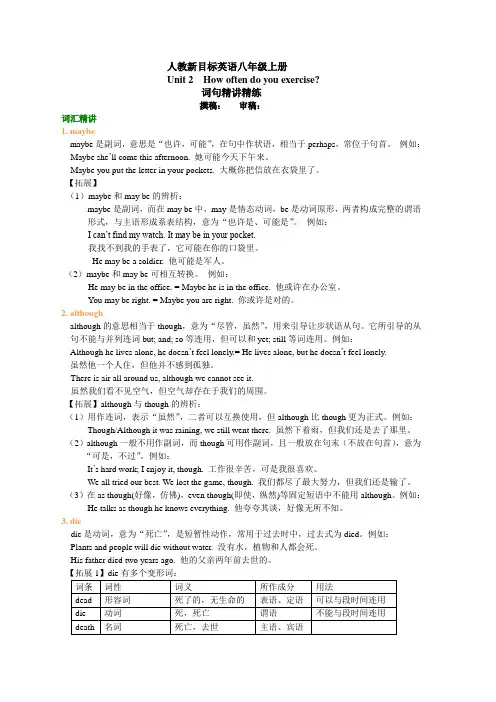
人教新目标英语八年级上册Unit 2 How often do you exercise?词句精讲精练撰稿:审稿:词汇精讲1. maybemaybe是副词,意思是“也许,可能”,在句中作状语,相当于perhaps,常位于句首。
例如:Maybe she’ll come this afternoon. 她可能今天下午来。
Maybe you put the letter in your pockets. 大概你把信放在衣袋里了。
【拓展】(1)maybe和may be的辨析:maybe是副词,而在may be中,may是情态动词,be是动词原形,两者构成完整的谓语形式,与主语形成系表结构,意为“也许是、可能是”。
例如:I can’t find my watch. It may be in your pocket.我找不到我的手表了,它可能在你的口袋里。
He may be a soldier. 他可能是军人。
(2)maybe和may be可相互转换。
例如:He may be in the office. = Maybe he is in the office. 他或许在办公室。
You may be right. = Maybe you are right. 你或许是对的。
2. althoughalthough的意思相当于though,意为“尽管,虽然”,用来引导让步状语从句。
它所引导的从句不能与并列连词but; and; so等连用,但可以和yet; still等词连用。
例如:Although he lives alone, he doesn’t feel lonely.= He lives alone, but he doesn’t feel lonely.虽然他一个人住,但他并不感到孤独。
There is air all around us, although we cannot see it.虽然我们看不见空气,但空气却存在于我们的周围。
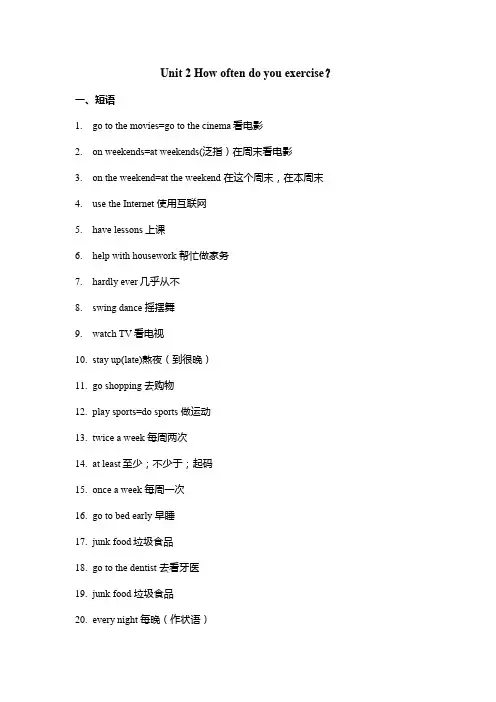
Unit 2 How often do you exercise?一、短语1.go to the movies=go to the cinema看电影2.on weekends=at weekends(泛指)在周末看电影3.on the weekend=at the weekend 在这个周末,在本周末e the Internet 使用互联网5.have lessons 上课6.help with housework 帮忙做家务7.hardly ever几乎从不8.swing dance 摇摆舞9.watch TV看电视10.stay up(late)熬夜(到很晚)11.go shopping 去购物12.play sports=do sports 做运动13.twice a week 每周两次14.at least至少;不少于;起码15.once a week 每周一次16.go to bed early 早睡17.junk food垃圾食品18.go to the dentist 去看牙医19.junk food 垃圾食品20.every night 每晚(作状语)21.16-year-old 16岁的22.how often 多久一次23.a lot of 许多,大量24.go camping 去野营25.free time activities 课余活动26.more than=over 多于27.teeth cleaning 洗牙28.not...at all一点也不29.fast food 快餐30.go online=surf on the Internet 上网31.the answer to...······的答案32.less than 少于33.a few几个,一些34.one to three times a week一周一至三次35.such as例如;像······这样36.most of 大部分37.old habits die hard 旧习难改38.have to do不得不做二、句型1. How many hours do you sleep every night? 你每晚睡多少个小时?2. I have piano lessons twice a week. 我每周上两次钢琴课。
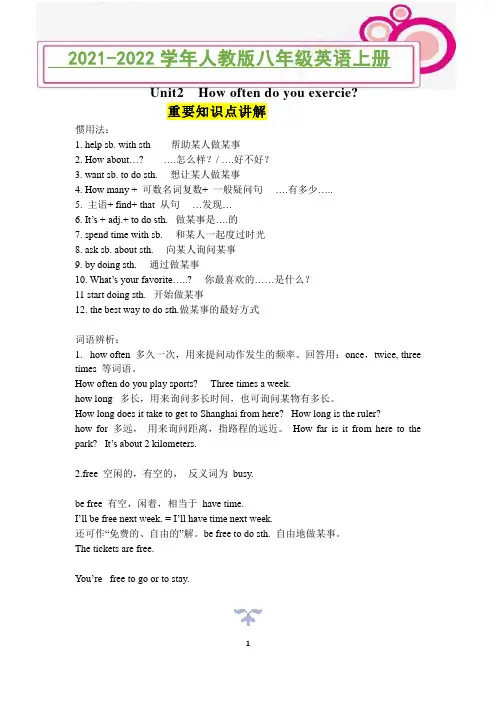
Unit2How often do you exercie?重要知识点讲解惯用法:1. help sb. with sth 帮助某人做某事2. How about…? ….怎么样?/ ….好不好?3. want sb. to do sth. 想让某人做某事4. How many + 可数名词复数+ 一般疑问句….有多少…..5. 主语+ find+ that 从句…发现…6. It’s + adj.+ to do sth. 做某事是….的7. spend time with sb. 和某人一起度过时光8. ask sb. about sth. 向某人询问某事9. by doing sth. 通过做某事10. What’s your favorite…..? 你最喜欢的……是什么?11 start doing sth. 开始做某事12. the best way to do sth.做某事的最好方式词语辨析:1. how often 多久一次,用来提问动作发生的频率。
回答用:once,twice, three times 等词语。
How often do you play sports? Three times a week.how long 多长,用来询问多长时间,也可询问某物有多长。
How long does it take to get to Shanghai from here? How long is the ruler?how for 多远,用来询问距离,指路程的远近。
How far is it from here to the park? It’s about 2 ki lometers.2.free 空闲的,有空的,反义词为busy.be free 有空,闲着,相当于have time.I’ll be free next week. = I’ll have time next week.还可作“免费的、自由的”解。
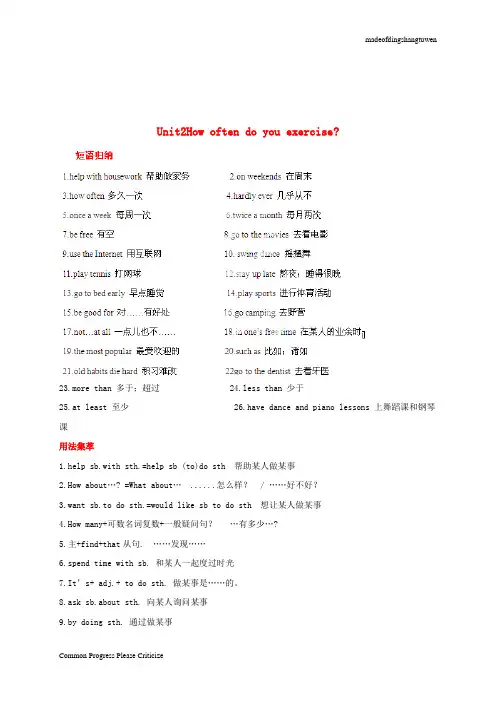
Unit2How often do you exercise?23.more than 多于;超过 24.less than 少于25.at least 至少 26.have dance and piano lessons 上舞蹈课和钢琴课用法集萃1.help sb.with sth.=help sb (to)do sth 帮助某人做某事2.How about…? =What about… ......怎么样? / ……好不好?3.want sb.to do sth.=would like sb to do sth 想让某人做某事4.How many+可数名词复数+一般疑问句?…有多少…?5.主+find+that从句. ……发现……6.spend time with sb. 和某人一起度过时光7.It’s+ adj.+ to do sth. 做某事是……的。
8.ask sb.about sth. 向某人询问某事9.by doing sth. 通过做某事10.What’s your favorite……? 你最喜爱的…是什么?11.the best way to do sth. 做某事的最好方式12.(1).不确定的频度副词:表示动作发生间隔(既频率)的副词。
它们有:always ; usually ; often ; sometimes ; seldom ; hardly ever ; never 等。
always(100%)> usually(约80%~90%)> often(约60%)> sometimes(约30%)> seldom(约20%)> hardly ever(约10%)> never(0%)在句中位置: 频度副词在句中通常放在be动词、助动词、情态动词之后, 在实义动词之前。
She is often late for school./I can never be sure./He always helps me.(2).表示确定的频率短语every day/week/month/year 每天/周/月/年;once a week 每周一次 ; twice a week 每周两次; twice a month 一月两次;three times a day 一天三次。
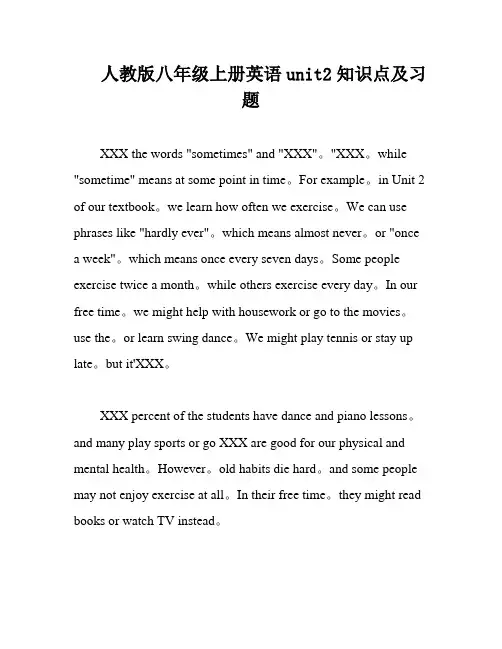
人教版八年级上册英语unit2知识点及习题XXX the words "sometimes" and "XXX"。
"XXX。
while "sometime" means at some point in time。
For example。
in Unit 2 of our textbook。
we learn how often we exercise。
We can use phrases like "hardly ever"。
which means almost never。
or "once a week"。
which means once every seven days。
Some people exercise twice a month。
while others exercise every day。
In our free time。
we might help with housework or go to the movies。
use the。
or learn swing dance。
We might play tennis or stay up late。
but it'XXX。
XXX percent of the students have dance and piano lessons。
and many play sports or go XXX are good for our physical and mental health。
However。
old habits die hard。
and some people may not enjoy exercise at all。
In their free time。
they might read books or watch TV instead。
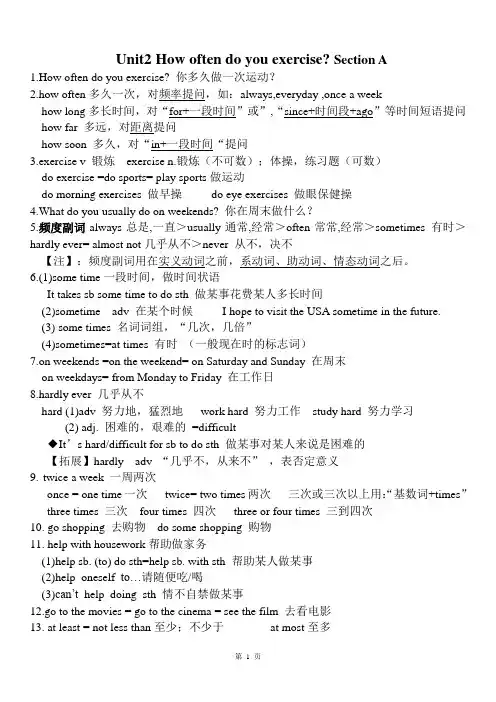
Unit2 How often do you exercise? Section A1.How often do you exercise? 你多久做一次运动?2.how often多久一次,对频率提问,如:always,everyday ,once a weekhow long多长时间,对“for+一段时间”或”,“since+时间段+ago”等时间短语提问how far 多远,对距离提问how soon 多久,对“in+一段时间“提问3.exercise v 锻炼exercise n.锻炼(不可数);体操,练习题(可数)do exercise =do sports= play sports做运动do morning exercises 做早操do eye exercises 做眼保健操4.What do you usually do on weekends? 你在周末做什么?5.频度副词always总是,一直>usually通常,经常>often常常,经常>sometimes 有时>hardly ever= almost not几乎从不>never 从不,决不【注】:频度副词用在实义动词之前,系动词、助动词、情态动词之后。
6.(1)some time一段时间,做时间状语It takes sb some time to do sth 做某事花费某人多长时间(2)sometime adv 在某个时候I hope to visit the USA sometime in the future.(3) some times 名词词组,“几次,几倍”(4)sometimes=at times 有时(一般现在时的标志词)7.on weekends =on the weekend= on Saturday and Sunday 在周末on weekdays= from Monday to Friday 在工作日8.hardly ever 几乎从不hard (1)adv 努力地,猛烈地work hard 努力工作study hard 努力学习(2) adj. 困难的,艰难的=difficult◆It’s hard/difficult for sb to do sth 做某事对某人来说是困难的【拓展】hardly adv “几乎不,从来不”,表否定意义9.twice a week 一周两次once = one time一次twice= two times两次三次或三次以上用:“基数词+times”three times 三次four times 四次three or four times 三到四次10.go shopping 去购物do some shopping 购物11.help with housework帮助做家务(1)help sb. (to) do sth=help sb. with sth 帮助某人做某事(2)help oneself to…请随便吃/喝(3)can’t help doing sth 情不自禁做某事12.go to the movies = go to the cinema = see the film 去看电影13. at least = not less than至少;不少于at most至多14. use the Internet 上网15.What’s your favorite program?=What program do you like best?你最喜欢的节目是什么?16.every day 每天= each day 做状语,放在句末,对其提问用how ofteneveryday = daily adj. 每天的,作定语,修饰名词,放在名词之前He exercises every day. 他每天都锻炼。
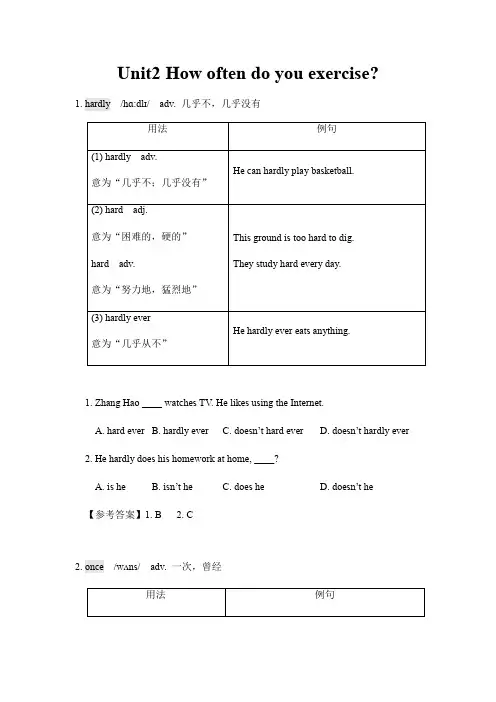
Unit2 How often do you exercise?1. hardly /hɑ:dlɪ/ adv. 几乎不,几乎没有1. Zhang Hao ____ watches TV. He likes using the Internet.A. hard everB. hardly everC. doesn’t hard everD. doesn’t hardly ever2. He hardly does his homework at home, ____?A. is heB. isn’t heC. does heD. doesn’t he【参考答案】1. B 2. C2. once /wʌns/ adv. 一次,曾经I go shopping with my mother _____ a month.A. one timeB. two timesC. onceD. three time 【参考答案】C3. twice /twaɪs/ adv. 两次,两倍We should think _____ before we make a decision.A. carefulB. twiceC. onceD. three times 【参考答案】B4. Internet /'ɪntənet/ n. (国际)互联网,因特网How often do you ______?A. find the InternetB. surf the internetC. surf the InternetD. find the internet【参考答案】C5. full /fʊl/ adj. 忙的;满的,充满的The glass _____ water.A. fillB. filled withC. full ofD. is full of 【参考答案】D6. maybe /'meɪbɪ/ adv. 大概,或许,可能辨析:maybe与may be—Did you see Richard?—No. he is in the playground.A. MightB. May beC. MaybeD. May 【参考答案】C7. at least 至少,不少于,起码Although the food I cooked wasn't delicious, _____ I could cook myself.A. at leastB. at lastC. because ofD. at all 【参考答案】A8. percent /pə'sent/ n. 百分之……1. Fifteen percent of the students __________ (come) from China.2. Thirty percent of his hair _____ (be) white.【参考答案】come, is9. online /ˌɒnˈlaɪn/ adj.&adv. 在线(的),联网(的)1. 一些在线游戏非常有趣。
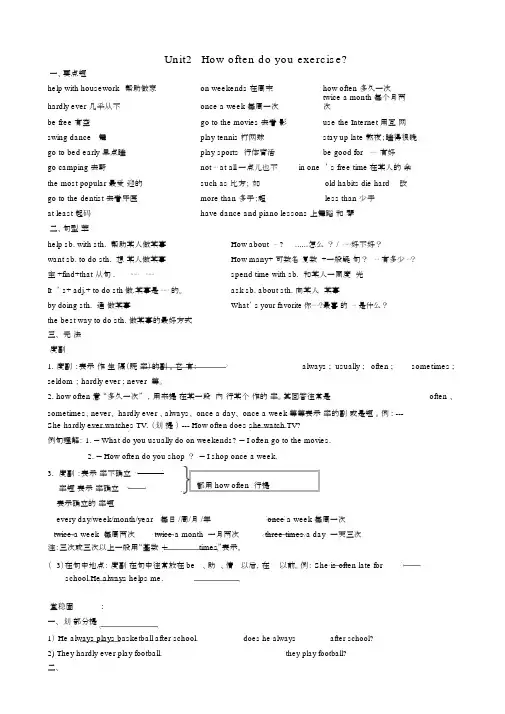
Unit2How often do you exercise?一、要点短help with housework帮助做家on weekends 在周末how often 多久一次hardly ever 几乎从不once a week 每周一次twice a month 每个月两次be free 有空go to the movies 去看影use the Internet 用互网swing dance 舞play tennis 打网球stay up late 熬夜;睡得很晚go to bed early 早点睡play sports 行体育活be good for ⋯⋯有好go camping 去野not ⋯ at all一点儿也不in one ’ s free time在某人的余the most popular 最受迎的such as 比方;如old habits die hard 改go to the dentist 去看牙医more than 多于;超less than 少于at least 起码have dance and piano lessons 上舞蹈和琴二、句型萃help sb. with sth. 帮助某人做某事How about ⋯ ?......怎么? / ⋯⋯好不好?want sb. to do sth. 想某人做某事How many+ 可数名复数 +一般疑句?⋯有多少⋯?主 +find+that 从句 .⋯⋯⋯⋯spend time with sb. 和某人一同度光It ’ s+ adj.+ to do sth做.某事是⋯⋯的。
ask sb. about sth. 向某人某事by doing sth. 通做某事What’ s your favorite你⋯⋯?最喜的⋯ 是什么?the best way to do sth. 做某事的最好方式三、元法度副1.度副:表示作生隔(既率)的副。

人教版初二英语八年级上册Unit2知识点Unit2 How often do you exercise?【重点语法】1. 频率副词: always,usually, often, sometimes, never频率副词在句中通常放在实义动词之前, be动词或助动词之后。
常用于一般现在时态中。
2.“次数”的表达方法一次once,两次twice,三次或三次以上:基数词+ times, 如:three times, five times,3. how often“多久一次”问频率,回答常含有频率词组或短语。
常见的how疑问词:1)How soon 多久(以后)—How soon will he be back?他多久能回来?—He will be back in amonth. 他一个月后能回来。
2)how long “多久”—How long did it take you toclean the house? 你打扫房子用了多久?—It took me half an hour to cleanthe house. 我打扫这房子用了半小时。
3)How many+名复How much+不可名“多少” 问数量(how much 还可问价格)【重点短语】1. go to the movies 去看电影2. look after = take care of 照顾3. surf the internet 上网4. healthy lifestyle 健康的生活方式5. go skate boarding 去划板6. keep healthy=stay healthy 保持健康7. eating habits 饮食习惯8. take more exercise 做更多的运动9. the same as 与什么相同10. be different from 不同11. once a month一月一次12. twice a week一周两次13. make a difference to 对......有影响/作用14. most of the students=moststudents15. shop=go shopping=do someshopping 购物16. be good for 对......有益17. be bad for 对......有害18. come home from school放学回家19. of course = certainly = sure 当然20. get good grades 取得好成绩21. keep/be in good health 保持健康22. take a vacation 去度假【词语辨析】1.maybe / may bemaybe 是副词,意为“大概,可能,或许”,一般用于句首。
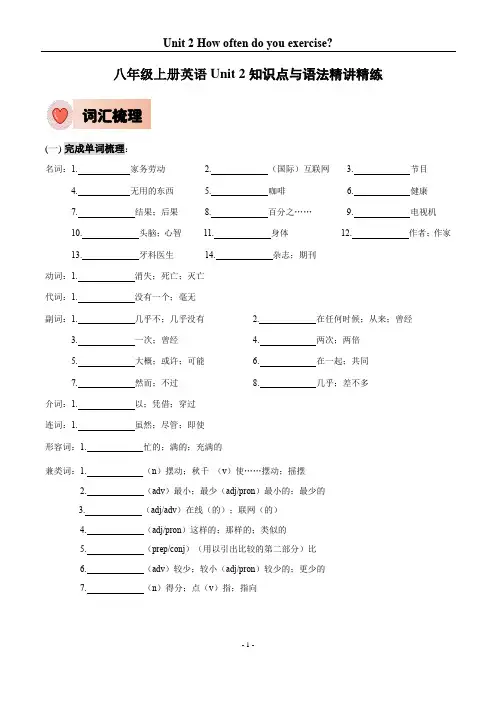
八年级上册英语Unit 2知识点与语法精讲精练词汇梳理(一)完成单词梳理:名词:1. 家务劳动 2. (国际)互联网 3. 节目4. 无用的东西5. 咖啡6. 健康7. 结果;后果8. 百分之……9. 电视机10. 头脑;心智11. 身体12. 作者;作家13. 牙科医生14. 杂志;期刊动词:1. 消失;死亡;灭亡代词:1. 没有一个;毫无副词:1. 几乎不;几乎没有 2. 在任何时候;从来;曾经3. 一次;曾经4. 两次;两倍5. 大概;或许;可能6. 在一起;共同7. 然而;不过8. 几乎;差不多介词:1. 以;凭借;穿过连词:1. 虽然;尽管;即使形容词:1. 忙的;满的;充满的兼类词:1. (n)摆动;秋千(v)使……摆动;摇摆2. (adv)最小;最少(adj/pron)最小的;最少的3. (adj/adv)在线(的);联网(的)4. (adj/pron)这样的;那样的;类似的5. (prep/conj)(用以引出比较的第二部分)比6. (adv)较少;较小(adj/pron)较少的;更少的7. (n)得分;点(v)指;指向(二) 词汇变形小结:1. one (num. 一) — (adv. 一次) — (第一)2. two (num. 二) — (adv.两次)— (第二)3. swing (v. 使……摆动) — (过去式)4. little (adj. 少的) — (比较级:更少的) — (最高级:最少的)5. health (n. 健康) — (adj. 健康的) — (adv. 健康地)— (反义词:不健康的) — (反义词:不健康地)6. die (v. 死) — (n. 死亡) — (adj. 垂死的) — (adj. 死的)7. write (v. 写) — (n. 作者;作家)【练一练】用所给词的适当形式填空1.Most parents don’t think it is ______________(health)for children to stay up too late at night.o She is a great ______________(write)and he’s especially famous for his play, Teahouse.3.If people don’t exercise, the illness can go into their ______________ (body) easily.4.It takes ______________(little)time to go there by underground than by bus.5.Jim got ten ______________ (point)in the basketball match.6.Take the medicine______________(two) a day, and you’ll feel better.7.Jack ______________(do) his homework every day.8.Mr. Li______________(teach) English in our school five years ago.9.At______________(little)ten students were late for school this morning.10.Many boys like playing football because they think it’s______________(relax).(三) 短语攻关:在周末上网几乎从不多久一次一周一次一周两次一周四到六次使用互联网去看电影熬夜至少对……有好处做运动打网球在某人的空闲时间去看牙医摇摆舞做家务垃圾食品例如怎么会呢?……的答案多于少于知识点梳理1.help with housework 帮忙做家务【用法详解】help sb with sth 表示在某方面帮助某人(帮助某人做某事),with后常跟名词或代词作宾语。
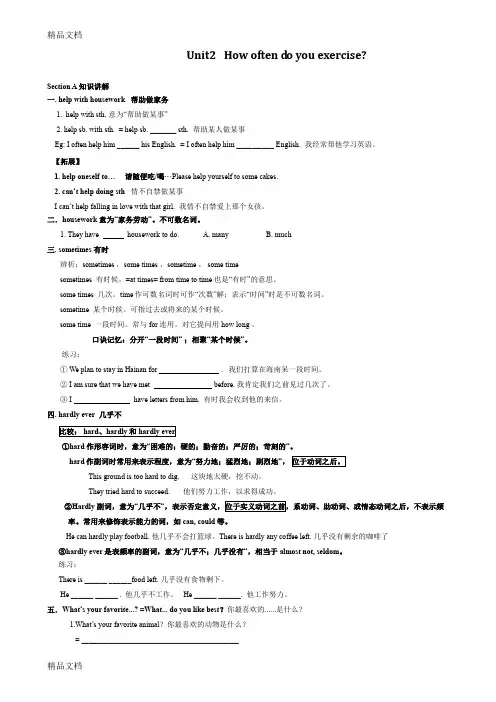
Unit2 How often d o you exercise?Section A知识讲解一. help with housework 帮助做家务1. help with sth. 意为“帮助做某事”2. help sb. with sth. = help sb. _______ sth. 帮助某人做某事Eg: I often help him ______ his English. = I often help him __________ English. 我经常帮他学习英语。
【拓展】1. help oneself to… 请随便吃/喝···Please help yourself to some cakes.2.can’t help doing sth 情不自禁做某事I can’t help falling in love with that girl. 我情不自禁爱上那个女孩。
二.housework 意为“家务劳动”。
不可数名词。
1. They have housework to do. A. many B. much三. sometimes 有时辨析:sometimes ,some times ,sometime , some timesometimes 有时候。
=at times= from time to time也是“有时”的意思。
some times 几次。
time作可数名词时可作“次数”解;表示“时间”时是不可数名词。
sometime 某个时候。
可指过去或将来的某个时候。
some time 一段时间。
常与for连用。
对它提问用how long 。
口诀记忆:分开“一段时间” ;相聚“某个时候”。
练习:① We plan to stay in Hainan for . 我们打算在海南呆一段时间。
② I am sure that we have met before. 我肯定我们之前见过几次了。
Unit 2 How often do you exercise?1, How如何(方式)how long多长(时间)答语常用"(For/about+)时间段"how far 多远(距离)答语常用"(It's+)数词+miles/meters/kilometers"how often多久一次(频率)答语常用"Always/ often/ every day/...v或"次数+时间” 等表频率的状语How soon多快,多久以后,常用在将來时中。
答语常用“in+时间段”how many多少(接可数名词)how much (接不可数名词)2,exercise 作v 锻炼,运动作[c] 操,练习do morning/ eye exercises作[uc] 锻炼take much/ more exercise3,at+钟点at 7 o'clock at noon/ at night (during/ in the day) at this/ that time at the age of on+具体某大、星期、特指的一天、纪念Fl、节Flon April 1st on Sunday on a cold winter morning on Teachers,Dayin +上午、下午、晚上、年、月、季节、年代、世纪in the morning/ afternoon/ evening in 1999 in August in autumn in 1960s in the 21st century4,help sb (to) do sthhelp sb with sthwith sb's help= with the help of sb5,do (the) houscwork= do chores6,频度副词(行前be后)Always usually often sometimes seldom hardly never7,sometimes有时(频度副词) sometime (将來)有朝一H,(曾经)某天Some times几次,几倍some time 一段时间(前血用介词for)8,go shopping= do some shopping9,once twice three times10,at onee, right now, right away, in a minute, in a moment, in no time 立亥马上once more再一次,重新once upon a time 从而,曾经11,every day每天everyday日常的,每天的12,on the internet13,what's your favorite program? =what program do you like best?14,free 空闲的in one's free time be free自由的as free as a fish freedom n•自免费的The best things in life are free.15,be full =bc busy 忙的be busy doing sth/ be busy with sthbe full of 充满eg: The bottle is full of milk.16,How come?怎么会?为什么?17,may be为情态动词+动词原形,在句子中做谓语,maybe是副词,表示可能,大概,一般放在句首(perhaps)。
人教新目标英语八年级上册单元知识点总结+练习题Unit 2 How often do you exercise?本单元重点句子读背What do you usually do on weekends? I always exercise.What do they do on weekends? They often help with housework.What does she do on weekends? She sometimes goes shopping.How often do you go to the movies? I go to the movies maybe once a month.How often does he watch TV? He hardly ever watches TV. Do you go shopping? No, I never go shopping.用法1) be good for对什么有益2) be bad for对什么有害3) want to do sth想做某事4) want sb to do sth想某人做某事5)try to do sth尽量做某事6)help sb (to) do sth帮助某人做某事7)ask sb about sth 问某人关于某事一.语法一般现在时:一般现在时:表示通常性、规律性、习惯性的状态或者动作.通常与副词sometimes, often, usually, always, every day (year, month ),等时间状语连用。
在一般现在时中,当主语是第三人称单数时,谓语动词要用第三人称单数形式,即常在动词原形后加-s或-es。
主语不是第三人称单数,动词用原形。
例如:1.She has lunch at twelve. 她十二点吃午餐。
2.Tom and Mike like waching TV.肯定句: She often watches TV in the evening.否定句(加助动词don’t 或doesn’t):She doesn’t often watches tv in the evening.一般疑问句(把do或者does提前):Does she watches TV in the evening?肯定回答: Yes, she does. 否定回答: No, she doesn’t.动词的三单形式规则:1)一般动词+s:make –makes;2)以s、sh、ch、o、z、x结尾的动词+es:wash –washes go –goes;3)以辅音字母加y结尾的动词改y为i再加es:fly –flies cry –cries;4)以元音字母加y结尾的动词直接加s:play –plays。
2019-8-5Unit2Howoftendoyouexercise? 一、短语归纳helpwithhousework 帮助做家务onweekends 在周末 howoften 多久一次hardlyever 几乎从不onceaweek 每周一次twiceamonth 每月两次everyday 每天 befree 有空gotothemovies 去看电影usetheInternet 用互联网 swingdance 摇摆舞playtennis 打网球stayuplate 熬夜;睡得很晚 atleast 至少havedanceandpianolessons 上舞蹈课和钢琴课 gotobedearly 早点睡觉playsports 进行体育活动 begoodfor 对……有好处gocamping 去野营not…atallmornthan 某事Howmany+主语光bydoingsth.么?二、语法讲解1.exercise (1)(动):2)((练习:1D. plays—1)goshopping 意为“去购物”。
Go+v-ing:表示进行某项活动。
如:Goswimming/shopping/skating/skiing/fishing/climbing/hiking2)频率副词:always=allthetime,usually,often,sometimes=attimes,hardlyever,never 它们用来表示动作发生的频率,频度副词放在be 动词、情态动词和助动词之后,实义动词之前,在程度上有所区别,频率由高到低依次是:always>usually>sometimes>seldom>hadlyever>never100%80%60%30%10%0%(1).sometimes:有时候;sometime :某时;sometimes :许多次/倍;sometime:一段时间(2).hardly(adv):几乎不hard 硬的;eg:Thestoneishard.困难的;严厉的;勤奋的ahardwriter努力地;猛烈地study/rainhard 练习1、Thegroundistootodig2、Icanunderstandthem.3、It'sraining,thepeoplecangooutside.4、—How was the weather yesterday?——It rained _______. People could ___________go out.A. hardly; hardB. hard hardC. hardlyeveryday (每表示。
Unit2 How often do you exercise?【重点语法】1. 频率副词: always, usually, often, sometimes, never频率副词在句中通常放在实义动词之前, be动词或助动词之后。
常用于一般现在时态中。
2.“次数”的表达方法一次 once,两次twice,三次或三次以上:基数词+ times, 如:three times, five times,3. how often“多久一次”问频率,回答常含有频率词组或短语。
常见的how疑问词:1)How soon 多久(以后)—How soon will he be back?他多久能回来?—He will be back in a month. 他一个月后能回来。
2)how long “多久”—How long did it take you to clean the house? 你打扫房子用了多久?—It took me half an hour to clean the house. 我打扫这房子用了半小时。
3)How many+名复How much+不可名“多少” 问数量(how much 还可问价格)【词语辨析】1. maybe / may bemaybe 是副词,意为“大概,可能,或许”,一般用于句首。
May be是情态动词,意为“可能是...,也许是...,大概是...”.The baby is crying. Maybe she is hungry.The woman may be a teacher.2. a few / few / a little / littlePeople can live to 100, but few people can live to 150. There is little time left. I won’t catch the first bus.Could you give me a little milk?3. hard / hardlyhard作形容词,意为“困难的,艰苦的,硬的”;作副词,意为“努力地,猛烈地”。
初中英语题集八年级上unit2 How often do you exercise?一.词汇变形单词1.hardly adv.几乎不;简直不;刚刚——hard adj.困难的—— hardness n. 坚硬,硬性2.Internet n.因特网——international adj.国际的—— internationally adv. 国际性的;国际上的3.program n.节目;程序;课程;节目单——programmer n.程序设计者—— programmed v.训练培养4.full adj.满的;充满的;完全的—— fully adv.完全地;充分地—— fuller n. 漂洗工;套锤5.swing n.摇摆;秋千v.摇摆;旋转——swings n. 秋千—— swinging adj. 愉悦的多姿多彩的6.junk n.垃圾;废旧杂物——junky n.吸毒者adj.质量低劣的—— junket n.公费旅游7.health n.健康;人的身体或精神状态—— healthy adj.健康的,健全的—— healthily adv.健康地8.result n.结果;后果—— resulting adj.作为结果的,因而发生的—— resultant n.结果9.percent adj.百分之...的——percentage n.百分比—— percentile n. 百分位10.mind n.头脑;想法;意见;心思—— mindful adj.留心的;注意的——mindless adj. 愚笨的;不小心的11.die v.死;枯竭;消失—— dead adj.死去的完全的—— death n.死亡12.writer n.作者;作家—— writing n. 写作——write v.写13.dentist n.牙科医生—— dentistry n. 牙医学——dental adj.牙齿的牙科的14.teenager n.青少年—— teens n. 十几岁十三到十九的数字——teeny adj. 极小的15.point n.看法;要点;重点;小数点;目标;分数——pointed adj.尖锐的—— pointless adj.无意义的He (几乎不)watches TV.典型例题1.相似题1)She h (几乎不)eats anything.2)In the evening he h (几乎不)exercises.3)We could h (很难)believe our eyes.答案:hardly ever ;hardly ever; hardly ever; hardly2.Our questions were about exercise,use of the (互联网)and watching TV.相似题1)You can find all kinds of information on the (互联网).2)Most of the children like surfing the (互联网).3)(互联网)has changed our life.答案:internet;internet;internet;internet3.What is your favorite (节目)?相似题1)Mary likes the (节目)every much.2)The animal world is always kids’ favorite (节目).3)Tom and john all like the funny (节目).答案:program;program; program;program4.Next week is quiet (满的)for me.相似题1)Her life was too (满的)to find time for hobbies.2)Hotels are often (满的)at this time of the year.3)The bus was (满的)when they got there.答案:full;full;full;full5.Oh, (摇摆)dance,it’s fun.相似题1)(摇摆舞)is a kind of dancing.2)His moods alarmingly.他的心情时好时坏,令人担心.3)You’ve been on the for ten minutes,it’s my go now.你荡秋千有10分钟了,现在该轮到我了。
人教版八年级英语上册Unit2知识点和练习Unit 2 What’s the matter?固定短语1. Have a cold 感冒2. sore back 背痛3. neck and neck 并驾齐驱,齐头并进4. I have a stomachache 我胃痛= I have got a stomachache= There is something wrong with my stomach= My stomach hurts= I have (got) a pain in my stomach5. What’s the matter? 怎么了?= What’s the trouble (with you)?= What’s your trouble?= What’s wrong (with you)?= What’ the matter (with you)?=What has happened to you?= Is there anything wrong (with you)? = what’s up?6. sore throat 咽喉痛7. lie down and rest 躺下休息8. see a dentist 看牙医9. drink lots of water 多喝水10. hot tea with honey 加蜂蜜的热茶11.That’s a good idea 好主意12.That’s too bad 太糟糕了13.I think so 我认为如此14. I’m not feeling well. 我觉得不太舒服= I’m not feeling fine/all right.= I’m feeling ill/sick. =I feel terrible/bad.= I don’t feel well.15. get some rest 多休息16. I have no idea = I don’t know 我不知道17. stressed out 筋疲力18. I am tired 我累了He is tired. 他累了19. a healthy lifestyle健康的生活方式20. traditional Chinese doctors传统中医21. a balance of yin and yang阴阳调和22. you have too much yin.你阴气太盛23. to eat a balance diet饮食平衡24. healthy food 健康食品25. stay healthy 保持健康=keep healthy=keep in good health= keep fit26. enjoy oneself (myself, yourself, herself, himself, themselves, ourselves, itself反身代词) 玩得高兴,过得愉快=have a good time = have a wonderful time= have fun27. enjoy sth. =like sth. (名词)喜欢某物,enjoy doing sth.喜欢做某事=like dong sthpractice doing sth.练习做某事,mind doing sth. 介意做某事,finish doing sth.完成某事,give up doing sth.放弃做某事,can’t help doing sth.忍不住做某事,keep ding sth. 坚持做某事. (keep on doing sth. / keep sb. doing sth. )be busy doing sth. 忙着做某事be used to doing sth.习惯于做某事make a contribution to doing sth.为..做贡献go on doing sth. 继续做某事forget doing sth.忘记做某事remember doing sth. 记得做某事spend....(in) doing sth. 花(时间)来做某事prefer doing sth.to doing sth.比起(做...)来更愿意(做...)28. at the moment = now 此刻29. Host family 东道家庭30. Conversation practice会话练习31. I’m sorry to hear that.听到此事我很难过Section A知识要点1. What’s the matter?这句话通常用于询问别人身体有什么不舒服,或有何麻烦,后跟with构成:What’s the matter with…?类似的句子还有:What’s wrong with…? What’s the trouble with…? 他们的答语往往是表示得了什么病,或什么地方不舒服,常用句型“somebody has/have a+相应的名词”。
Unit2 How often d o you exercise?一. help with housework 帮助做家务1. help with sth. 意为“帮助做某事”2. help sb. with sth. = help sb. _______ sth. 帮助某人做某事Eg: I often help him ______ his English. = I often help him __________ English. 我经常帮他学习英语。
【拓展】1. help oneself to… 请随便吃/喝···Please help yourself to some cakes.2.can’t help doing sth 情不自禁做某事I can’t help falling in love with that girl. 我情不自禁爱上那个女孩。
二.housework 意为“家务劳动”。
不可数名词。
1. They have housework to do. A. many B. much三. sometimes 有时辨析:sometimes ,some times ,sometime , some timesometimes 有时候。
=at times= from time to time也是“有时”的意思。
some times 几次。
time作可数名词时可作“次数”解;表示“时间”时是不可数名词。
sometime 某个时候。
可指过去或将来的某个时候。
some time 一段时间。
常与for连用。
对它提问用how long 。
口诀记忆:分开“一段时间” ;相聚“某个时候”。
练习:① We plan to stay in Hainan for . 我们打算在海南呆一段时间。
② I am sure that we have met before. 我肯定我们之前见过几次了。
③ I have letters from him. 有时我会收到他的来信。
四. hardly ever 几乎不①hard作形容词时,意为“困难的;硬的;勤奋的;严厉的;苛刻的”。
hard作副词时常用来表示程度,意为“努力地;猛烈地;剧烈地”This ground is too hard to dig. 这块地太硬,挖不动。
They tried hard to succeed. 他们努力工作,以求得成功。
②hardly 副词,意为“几乎不”率。
常用来修饰表示能力的词,如can, could等。
He can hardly play football. 他几乎不会打篮球。
There is hardly any coffee left. 几乎没有剩余的咖啡了③hardly ever是表频率的副词,意为“几乎不;几乎没有”,相当于almost not, seldom。
练习:There is ______ ______food left. 几乎没有食物剩下。
He ______ ______ . 他几乎不工作。
He ______ ______. 他工作努力。
五.What’s your favorite...? =What... do you like best?你最喜欢的......是什么?1.What’s your favorite animal?你最喜欢的动物是什么?= __________________________________________六. free 意为“空闲的,有空的”反义词busy. be free 意为“闲着,有空”eg::He is free now.他现在有空。
拓展:free还可译为“免费的”Eg:The tickets are free. 票是免费的。
七. quite full 很忙,相当忙.1. adj. full 还可译为“满的,充满的”。
反义词是empty,意为“空的”。
Eg:The bus was full when they got there. 翻译________________________________________.拓展:A be full of B. = A be fill with B; A中充满了B。
The room is full of students. The bus is full of people.The hall is _______ people. A. fill with B. full with C. filled of D. filled with2.full adj. “饱的”。
其反义词是hungry,意为“饥饿的”。
Are you hungry or full?你饿了还是饱了?Eg:I can’t eat any more,I am quite full. 我不能再吃了,我相当饱了。
八. maybe “也许,大概,可能”,常位于句首。
Eg:Maybe he knows Tom. 也许他认识Tom。
辨析:maybe 和may beLily an English teacher. Lily可能是一名英语老师。
=________________________________________九.at least 意为“至少”。
其反义词为at most “最多”。
Eg:There are at least 1,500 students in our school. _____________________________________。
十. how often意为“多久一次”,常用于对时间频率的提问。
回答可用once/twice/three times a day(一天一/两/三次),sometimes(有时),never(从不),very often(经常)等。
How often do you watch TV? 你多久看一次电视?【拓展】十一.look、see、watch和read辨析:look为不及物动词,后接宾语时须用介词at,指看的动作。
see着重于看的后果,即“看到,看见”。
read多指“看书、报”,这里的“看”实为“读”。
watch表示“注视,观看,监视”之意。
也常用于“看电视,看比赛”等短语中。
一. want sb. to do sth. 的否定形式为want sb. _____to do sth.Eg:She wants me to bring him some pens. 否定:She wants me__________________ him some pens.拓展:1.want sth. 想要某物 2.want to do sth. 想要做某事3. want (sb.)to do sth.=would like/love (sb.)to do sth.二. be good for 意为“对……有益”。
反义词为be bad for “对……有害”。
Eg: Vegetables are good for you. 蔬菜对你有好处。
【拓展】1.be good to“对…好”,其反义短语为be bad to“对…不好”。
2. be good at“在…方面擅长”, at后面常接名词、代词或动词-ing形式,同义短语为do well in。
She is good at English and Chinese. = She does well in English and Chinese. 她擅长英语和汉语。
I am good at __________________(play)basketball.3. be good with “和…相处得好;擅于和…相处”。
Are you good with children? 你和孩子们相处得好吗?Eg:I asked my teacher about today’s homework.三. Here are the results. 这是(调查)结果。
here 位于句首,句子要倒装。
Here is + 单数名词。
Here are + 复数名词.Eg:Here is your jacket. 这是你的夹克。
四. 1. 百分数由percent来表示,构成:基数词+percent ,常用“数词+percent of+名词”这一结构作主语时,谓语的单复数要看percent of 后跟的名词,如果是可数名词复数,谓语应该用复数,如果是不可数名词,谓语应该用单数Thirty percent of the students ______ ( like) watching game shows.70 percent of water _______ ( be ) salty water(盐水)。
五.surprised 惊奇的,感到意外的1. be surprised at sb. / sth. / doing sth.对…感到惊奇, We are surprised at the news.2. be surprised to do sth.对做某事感到惊讶。
I’m very surprised to meet you here.3. be surprised that + 从句.因…而感到惊讶。
I’m surprised that he came here on time.【拓展】 surprising 令人惊讶的to one’s surprise 令某人惊讶的是in surprise 惊讶地;吃惊地六.the answers to questions问题的答案the way to sp 去某地的路七 . most students = most of the students 大多数学生1. most +复数名词. Most birds can fly.大多数鸟儿会飞. __________ 大部分时间2. most of + 限定词+复数名词 most of the girls , most of my friends3. most of + 人称代词宾格 most of them / us______ the students like reading the story. A. Most B. Most of4. the +most +多音节形容词,表示最高级,意为“最”。
This is the most beautiful flower. 这是最漂亮的花。
如果most前有不定冠词a,则表示“非常;很”,相当于very。
She is a most beautiful girl. 她是个非常漂亮的姑娘。